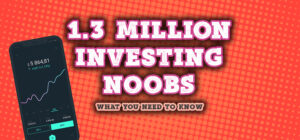
In a recent post we looked at our biggest money regrets and we thought rather than just dwell on the stuff we got wrong, let’s also look at the stuff we got right. So, in this post we’re looking at our 5 best money decisions ever!
Hopefully these inspire you with your own money decisions. Now, let’s check it out…
Today’s offer: New users to Genuine Impact, the research and analysis tool, will receive 1 month’s PREMIUM access for free when you sign up via the link on the Offers Page. Be sure to check them out!
Alternatively Watch The YouTube Video > > >
#1 – Quit Job, After Job, After Job!
This applies no matter what age you are but it’s particularly important if you’re young. The fastest way to increase your salary is to job-hop and that is exactly what we both did, earning big pay rises each time. Job loyalty will cost you a fortune in missed promotions and pay rises!
When you first set out and enter the workforce as a bright-eyed and bushy-tailed graduate or school leaver you will be paid a pittance – and rightly so because you have no experience. You need to get experience pronto.
After Uni – so we were 22 – we both got jobs earning around £23k but we were both able to double that by the time we were 30. We didn’t do this by working ridiculous hours, being the best, or kissing the boss’s ass. Hell no!
Unless you’re a massive overachiever who is able to fly up the ranks within one company – which is rare – we find that most people who stick to one job end up getting stagnated.
They find themselves doing the same crappy job for way too many years and learning nothing new. You pretty much learn the entire role within a few months and then only gain additional experience in very small increments, over years. An employer will not pay you more unless you offer more.
To offer more, you need experience, which you get by changing jobs. Even if you end up doing the exact same job at a different company your CV or profile is boosted because of it.
Don’t believe us? Put yourself in the shoes of an employer who is interviewing candidates for a job. Who are you more likely to hire? The candidate who has been doing the same job for the past 10 years, learning nothing new, or the candidate who has worked at multiple companies and gained a wealth of knowledge?
My first ever full-time job was at IBM. I don’t know the exact reason how I got the job, but I do remember seeing the interviewer’s eyes light up when he heard I had previously worked for their direct competitor.
#2 – Lifetime Tracker Mortgage
Most companies like to lock you in to whatever service they provide. Take out a Sim-only phone contract and you’ll get a better deal if you agree to a 12-month or longer contract compared with a monthly rolling contract. It’s the same with Sky TV. Agree to an extended contract and you only need pay 8 kajillions each month instead of 10 kajillions!
A similar pricing strategy is used by the banks when providing mortgages. These days most people end up taking out fixed-term mortgages for 2-5 years. The bank hopes that you:
- a) roll onto the much more expensive standard variable rate; or
- b) remortgage with them, so you’re locked in once again; or
- c) pay off the mortgage early and thus incur rip-off early repayment charges.
I have always hated being tied down and tend to avoid any company that tries to lock me in, even if I have to pay more for the added flexibility. My first ever mortgage had a 3% early repayment charge, which would have cost me £11,000 if for whatever reason I needed to sell the house.
When it was time to remortgage I vowed to myself that I would never do that again, so when the time came, I opted for a lifetime tracker mortgage. The monthly repayments were slightly more expensive than the alternatives, but you can’t put a price on freedom.
It turned out to be one of the best financial decisions I ever made. My girlfriend and I ended up breaking up and selling the house. Thankfully, we could walk away with no financial penalties.
Strangely, we don’t get that many people asking us for help about which mortgage to pick, even though it’s one of the biggest financial decisions of your life. Life is too unpredictable to be locked into a mortgage for several years, so if we can provide any assistance with choosing a mortgage it would be this: think twice before accepting any mortgage with early repayment charges. If you are forced to sell it could be a financial disaster.
It might be a relationship breakup, redundancy, or worse – a debilitating illness. Sadly, all these things are more common than you think and could quite easily happen to you.
#3 – Financial Freedom Insurance
Half of you might be thinking, “Wow, financial freedom insurance. That sounds cool, what’s that?” The other half will be thinking, “Yawn, insurance is for mugs.” But don’t scoff just yet: hear us out.
Financial Freedom Insurance is the cool name we call Income Protection Insurance, because that’s what it is to us. It’s insurance that we’re taking out to cover us while we’re on the path to freedom, between now and the time our investment pots grow big enough to pay us our forever-incomes.
We are both on the path to financial freedom and one of the biggest risks that could derail these awesome plans is a debilitating illness or accident leaving us unable to work. It needn’t even be anything that major – just enough to stop us from producing videos. Losing the use of our hands or voice for example.
After reading about a voice actor who suffered a stroke and was left unable to speak and so sadly would likely never be able to do voiceover work again, we decided we couldn’t let something similar happen to us.
By taking out Income Protection Insurance we have effectively guaranteed our financial futures today. Either we become financially free through illness, or we achieve it the good old-fashioned way – by grafting and investing as much money as we can.
Income Protection Insurance comes in many forms but we both chose policies that will pay us an income right up until we’re 68. Surprisingly, attaining this peace of mind is far cheaper than you would ever imagine – for Ben (MU co-founder) it’s just £17 a month.
If securing your financial future is something you’re interested in, then check out this page and you can get a no obligation quote from the same broker that we both used.
This might sound like we’re trying to entice you into using one of our referral links, but it’s really not the case. We both took out Income Protection Insurance and consider it essential for any sound financial freedom plan.
#4 – Decided To Go Into Business
Changing jobs regularly was the best thing we did to boost our salaries but the decision to go it alone was the action that had the most far-reaching impact on our lives.
The story is Money Unshackled legend. We both knew that simply working for somebody else was never going to give us the money or freedom that we longed for.
In January 2018, we met up at a hotel bar on the side of the M62 motorway to brainstorm business ideas. Days later Money Unshackled was born, the company registered, and website domains and social media tags claimed.
As inspiration for you guys, we’d like to say that we became millionaires soon after this as all that internet money came flowing in but that wouldn’t be entirely truthful. The truth is we’re not there yet and it’s been a grind, but we do get paid to do what we love – which is talking about money and investing.
An added benefit of starting this particular business is we literally get paid to think about money 24/7. Our investing strategies have been massively improved because we’ve had more time to learn the best ways to invest and manage money.
One such example is that we recently put together a long-term spread betting strategy that should comfortably amplify our investment returns into the double digits. We’re so excited to see how this plays out and the returns promise to be life changing. You can read about it here. It’s definitely worth checking out if you too want to supercharge your investment gains.
The best feeling you get from starting a business is when that first bit of income comes in, because it’s money you’ve made for yourself from nothing. Our first £50 earned from Money Unshackled means way more to us than all the money earned from a job.
#5 – Make Short-Term Sacrifices
This last one is a catch-all point. It covers all the sacrifices that we make and continue to make to achieve our financial goals. Dave Ramsey says it best when he says, “If you live like no one else, later you can live like no one else.”
Everything worthwhile in life can only be earned by paying the price. If you want to be the next Ronaldo, you have to eat the right food and train day and night. If you want to get the best grades and get into the best University, you need to put in the time and study hard. Those are the sacrifices required. There are no shortcuts.
If you want to get ahead financially you need to cut expenses and maximise income.
In my early twenties I was prepared to sacrifice my independence by living with my parents for a few years, and doing so allowed me to save and, crucially, invest a small fortune.
Forget the stigma about not flying the nest. Nobody will be laughing at you when you’re financially free while they’re still toiling in the mine. On reflection this might have been my best ever financial decision.
Most young people will do the same but blow all their money on toys, holidays, and cars – completely squandering the opportunity to build wealth. They have sacrificed their independence and have nothing to show for it. Even on minimum wage if you live practically rent-free you should be able to put aside several thousand pounds a year.
Disposable income in your twenties is worth way more than disposable income later in life because the sooner you earn it, the sooner it can be invested, and the sooner it can begin to compound.
Ben too sacrificed his personal living space by getting a lodger for the best part of 2 years. He was able to earn around £8,000 at a crucial juncture in his 20s, when a few grand at the right time can be the difference between life success and life failure.
This additional cash buffer enabled him to feel comfortable jumping jobs frequently without having to have the next job lined up, leading to better choice of opportunities and more cash!
#6 – Live Plan B
We said 5 but here’s a bonus. Like most young people I didn’t know what I wanted to do career-wise. But I did know I couldn’t sit around waiting to figure it out. Weeks turn into months, months turn into years, and before you know it you’ve wasted the best years of your life working for peanuts.
Like most people I never had a solid Plan A… so I got to work on Plan B. I ended up pursuing a career in financial analysis and becoming a Chartered Management Accountant.
Ben too became Chartered. Working in accounting and finance may not have been a dream job but it was relatively well paid and allowed us the time to work on Money Unshackled in the evenings and at weekends.
There’s a fantastic YouTuber called Sean Cannell, who helps people grow their influence on social media. One thing he said really resonates with us: “I worked a day job at a restaurant for 10 years while working on my dream job on the side… keep grinding.”
Worst case we have a solid career to fall back on. The point we’re trying to make is: a good plan B is better than no plan at all. You can figure out Plan A later.
What are the best money decisions that you’ve made? Join the conversation in the comments below.
Written by Andy
Featured image credit: diy13/Shutterstock.com
Also check out the MoneyUnshackled YouTube channel, with new videos released every Wednesday and Saturday:





